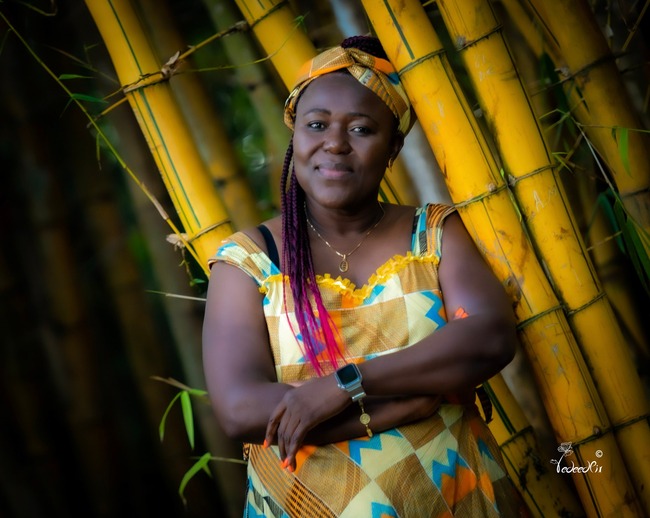Hopping from car to car, through bush roads and across borders, Sallymatu Kuyateh escaped the only home she’d ever known.
No family. No friends. Just enough money to get her to the other side – anywhere other than where she was.
The year was 1998. For the past eight years, Sierra Leone had been riddled by civil war.
By the end of the fighting, at least 50,000 people were dead and two million displaced. But that was still four years away.
Alone, Ms Kuyateh, who was in her mid-20s at the time, set out for Ghana via Guinea.
Fear was front of mind. But staying wasn’t an option.
Even if it meant saying goodbye to her family, her friends, her community – possibly forever – Ms Kuyateh had to leave.
“From Sierra Leone to Guinea, we had to travel through bush roads, using cars, and then you have to get to the border where the security was very heavy,” she said.
“You get searched very heavily to ensure that you don’t have any arms or money on you when you’re going into Guinea, so that was a bit challenging.
“Leaving Sierra Leone and going to Ghana was difficult because that was during the war. You were running away to be safe.”
Ms Kuyateh managed to secure a ‘job’ once she arrived in Guinea, buying and selling “anything that you can sell to raise money” just to survive.
Eventually she saved up enough for a plane ticket to Ghana, where she lived for eight years – briefy in a refugee camp, and then in the country’s capital, Accra, where she worked for an accounting firm.
Three or four years had passed before Ms Kuyateh was able to contact her family.
In the chaos of civil war, many Sierra Leoneans had fled to neighbouring countries, Guinea and Liberia. Ms Kuyateh didn’t know whether her family had fled or stayed behind.
“It’s a matter of trying to survive, and then you look for them,” she said.
Her parents had stayed in Sierra Leone as it was too challenging for them to leave, but Ms Kuyateh’s brothers had also fled to Guinea and were in a refugee camp.
Sierra Leone’s civil war and its aftermath deeply affected its population. Although Ms Kuyateh was eventually granted refugee status and safe passage to Australia, her experiences in Guinea and Ghana were at times harrowing.
“You still cannot forget about it,” she said.
“They are very brutal, very abusive, and say all sorts of things. It was really not good.
“My childhood was perfect, I didn’t have any problems. I was with my parents, it was more the period between 1990 when the war started, to 2000 that created that gap.
“Those 10 years were a terrible time, and it was just when I was getting to my teenage years. I was 18, then when it started.
“I had all these dreams. I was almost finished with my year 12. I was thinking of going out to uni to study, and this happened. So it was like, What do I do now?”
Today, the war’s aftermath still affects the Sierra Leonean-Australian diaspora in Logan and Brisbane.
“Having the war come in, people lost trust in themselves, because you don’t know who is the enemy and who is your friend,” Ms Kuyateh said.
“That’s what I think, created that mistrust. I’m sure that’s why, when we got to this part of the world, we still had those sorts of problems of trusting each other.”
Ms Kuyateh has founded and participated in many community organisations dedicated to bringing Sierra Leonean refugees and other Australians from African countries together.
The newest organisation she has been involved with, Sierra Leoneans in Queensland (SLiQ), formed as a result of infighting in previous groups.
“There were a lot of quarrels, people not talking to each other, people not feeling respected, and not feeling as being they are part of the community.
“So because of that, everybody stayed away [from each other] and there was no activity, no support for anybody within the community.
“Sierra Leoneans in Queensland has been a big step into uniting the community.”
Many of the community’s quarrels are tied to their struggles as refugees, like challenges to find gainful employment, lack of extended family and support infrastructures, and cultural differences.
“It’s just stress in the community, people not trusting each other, not really seeing ourselves as ‘we are there to help each other’,” Ms Kuyateh said.
When she arrived in Australia in 2005, getting a job was the highest and most challenging hurdle she faced.
“When I got here, it was a real challenge to get any job at all because you don’t have local experience, and there was nobody. It took me about one year and four months to be able to secure a job in Australia.”
In 2021, Ms Kuyateh set up a business of her own, Empathy Community Services, in Logan Central, where she employs people who are struggling to find work, supporting them to learn to work and earn money for themselves.
Ms Kuyateh is looking forward to growing her business and tackling the issues facing refugee communities in Logan, in particular, youth crime rates.
“We have a lot of our youth in detention centres, in prisons for crimes that under normal circumstances, they won’t get involved in,” she said.
“We have a sports team that encourages them to get fit and into sporting activities, which keeps them entertained.
“But still, we have a lot of our youth in prison areas, and we want to work together as a community to try to get them out and then help them to turn over their life and do something for themselves and their families.”
Ms Kuyateh said she spent her first five years in Brisbane trying to find herself, and the next five trying to find joy and her life’s passion.
“Now I think I’m at that point where I know exactly what I want to be doing with my life, which is what I’m doing,” Ms Kuyateh said.
“Now, it’s really busy, but it’s just nice seeing people coming together.
“I’m not looking for wealth or anything, I’m just looking for joy.”




